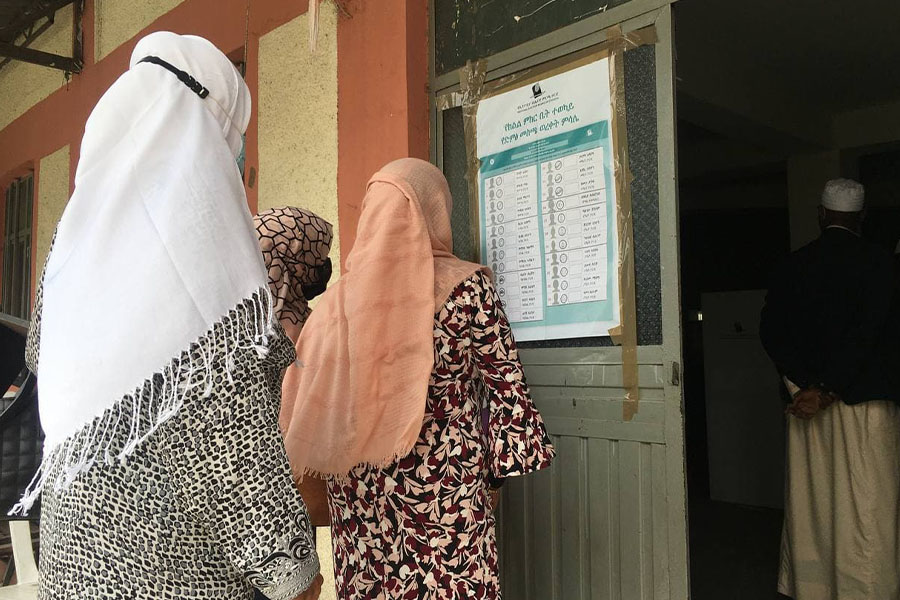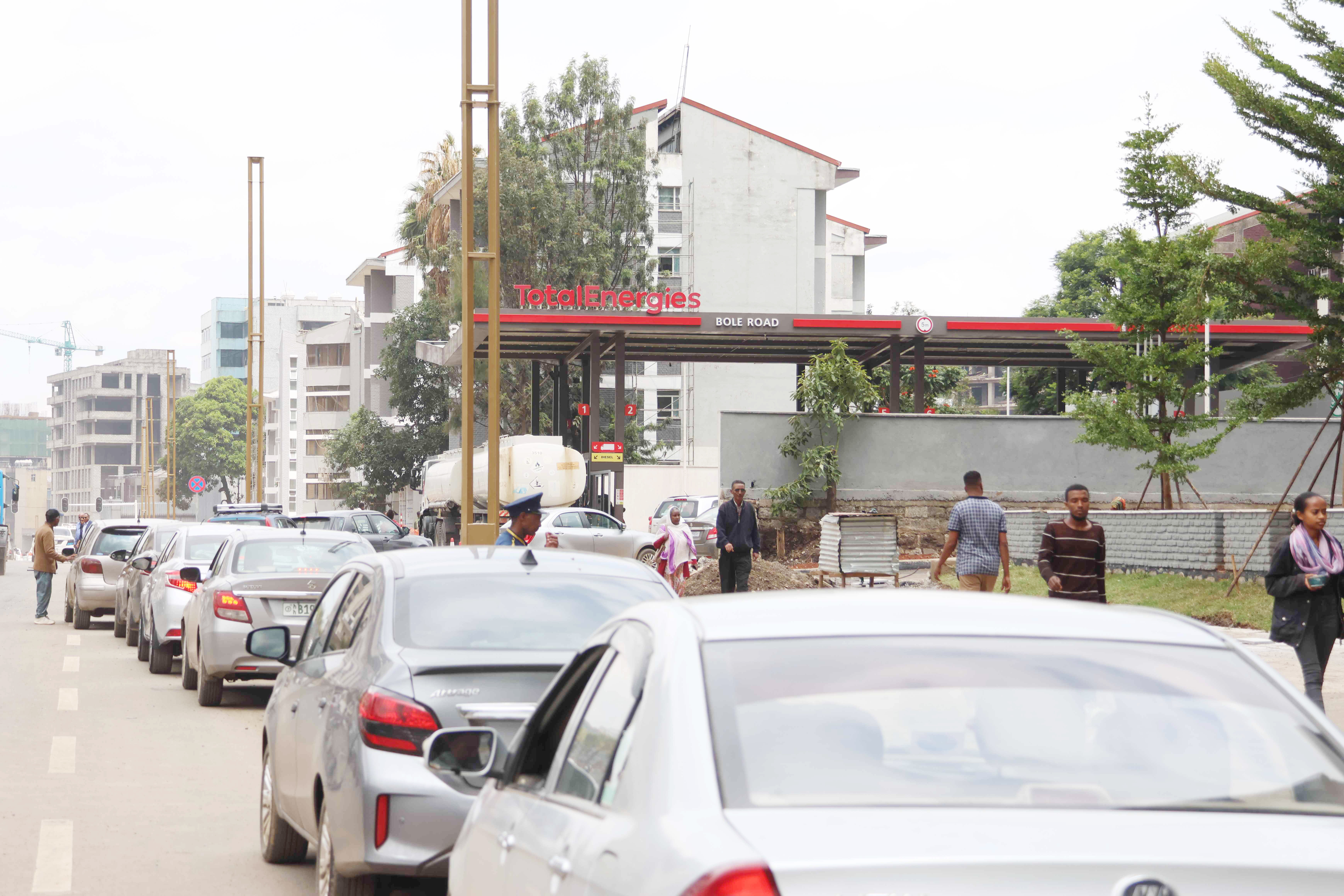
A narrow alleyway off a dusty road in the Bole Rwanda quarter used to be an afterthought for passersby rushing to the airport. Now, the same passage hums with the clink of cutlery and the chatter of diners speaking half a dozen languages.
What began as a trickle of foreign eateries has turned the neighbourhood into Addis Abeba’s most unlikely culinary crossroads, a sign of the broader change unfolding across the city’s restaurant scene.
The newest draw is Dar Muluk Al Yemen, translated as “House of the Yemen Kings.” Its limestone façade rises like a medieval fortress. Walls and gates are carved with Middle Eastern motifs, making the short walk from the pavement feel like a trip from the Horn of Africa to Arabia.
Inside, brass lanterns dimly light a hall large enough for 50 guests, which is perfumed by cardamom and slow-cooked lamb.
The venture is the creation of Jemal Abdulkadir, an Ethiopian of Yemeni ancestry who was once a minority shareholder in the long-running Yemen King restaurant a few blocks away. After six years, he decided to strike out on his own and opened the Restaurant three months ago near the Rwandan Embassy.
“We saw that the demand was everywhere,” said his son, Sahaal Jemal, a shareholder who noticed a mismatch between the growing Arabian expatriate population and the limited choice of Arabian food.
The house speciality is Mandi, fragrant rice blanketed with either lamb or chicken, alongside dishes such as Zurbian, shawarma, grilled meats, and roast chicken. Prices start at 800 Br and climb 10-fold for a whole roasted sheep that lands with the thump of celebratory theatre at the centre of a crowded table, often ordered for birthdays and business deals concluded.
Nearly every ingredient, from basmati rice to spice mixes and even the chicken, is imported.
“The lack of quality local supplies forced us to rely on imports,” said Sahaal.
About 100 cartons arrive each week, a logistics exercise that inflates costs but guarantees authenticity. A brigade of four Arab chefs and 20 local staff can serve only around 10 customers a day — foreign nationals form the bulk — but the operators are confident that “business will boom soon,’’ Sahaal said.
Peter Charuiyot, a Kenyan tech investor who visits Addis Abeba regularly, is part of the target crowd.
“I eat out of convenience and comfort,” he said, polishing off a plate of rice and chicken that reminded him of home.
On his first trip to Ethiopia five years ago, foreign food choices were sparse; now, he marvels at the pace and polish of the newcomers. The variety and quality, he says, “have certainly improved.”
That growth rests on a broader economic tailwind. A rising middle class, a pickup in tourism, and a swelling expatriate population. Addis Abeba has long sheltered culinary curiosities. Urban lore says the first was Ristorante Castelli, which opened on Mahatma Gandhi St. in 1957 for Italians who remained after the occupation.
But the past decade has multiplied these establishments. Some entrants arrived with foreign diplomats, others followed trade routes linking Ethiopia to China, India, and the Gulf states. Today, Indian, Italian, Chinese, and Japanese kitchens are the most common.
A three-kilometre corridor along Africa Avenue (Bole Road), running from Dembel Shopping Centre to the Skylight Hotel, hosts nearly 50 venues that sell foreign fare, from takeout counters hidden behind glass fridges to sprawling dining halls staffed with sommeliers and mixologists.
Not far from that strip stands Le Basilic, an Italian restaurant painted in warm terracotta.
General Manager Mulushewa Gulilat recalled that the owners, Dereje Asnake and Eden Marsa, lived in Switzerland for years before returning with a taste for European hospitality and a belief that Addis Abeba’s market was underserved.
“We saw untapped demand and a growing expat population,” he said.
The wager is paying off. Le Basilic serves about 100 diners a day, 80pc of them foreign nationals such as Italians and French. A fair number of curious locals also want to taste real Parmigiano rather than its processed cousin.
However, keeping the promise is harder these days. In the past nine months, a string of economic policy liberalisation, mainly a forex regime change, and higher import tariffs have pushed up costs, forcing Le Basilic to raise prices 12pc. Key supplies such as spices, cheese, tuna, bacon, beef, and flour still fly in from Switzerland because, as Mulushewa put it, “When our customers come, we want them to feel like they’re in Italy.”
The real pinch is the supply chain.
“Finding reliable suppliers who meet our standards has been difficult,” he admitted.
Some consignments sit for weeks at Djibouti port, while others get caught in foreign currency queues at local banks.
Some expatriates would nevertheless like even more choice. Paul Balnquer, a project manager at the United Nations Development Programme (UNDP), who relocated recently, dines out frequently for Asian or Italian fare.
“There just aren’t enough places to dine,” he said, ticking off cravings for ramen, pad thai and cannoli.
According to official data, the pipeline is filling fast. The Ethiopian Investment Commission lists 150 licensed foreign restaurants; 109 are operating, and 31 are in the works. Investors enjoy perks such as duty-free imports of equipment and construction materials, provided the Commission officials sign off.
The same registry counts more than 4,510 Chinese investors active in the country, and are among the most visible. Their companies have driven headline infrastructure projects, from roads and highrises to airports and bridges. These projects have left a visual imprint and an appetite for the tastes of home.
Chinese cuisine followed that footprint. More than 15 Chinese restaurants now dot Addis Abeba’s skyline. One of the smallest is Fie Gei Moutoun Soup Restaurant, off Rwanda St., near Washington Medical Centre, squeezed between a dozen larger competitors.
Its noodles, dumplings, Chinese pancakes, and “hair tales,” an offbeat beef tendon dish, cost between 700 and 1,100 Br. Yet, as rivals multiply, foot traffic has thinned.
“It’s a miracle if 10 people show up in a day,” lamented Belaynesh Worku, the sales manager.
Beyond modest storefronts, Chinese dishes have seeped into hotel buffets, and Indian cuisine is spreading on its own steam. Near St. Michael Church, a.k.a Bole Michael, across from the cargo terminal, neon-bright Viraj Indian Restaurant doubles as a 30-room lodge. Open for a little more than a year, it draws up to 50 patrons daily, about half of them Indian nationals, but also Somalis, Chinese, and Ethiopians.
To preserve taste, spices come from India, though cumin and chicken can be sourced locally. Items run from 150 Br for a sandwich to 2,000 Br for a whole tandoori chicken that arrives sizzling on an iron platter.
“Chicken Tiba is one of our most loved items,” said General Manager Birhan Getu, referring to the spicy fried chicken legs that sell for 1,100 Br.
Dipuk Sankur, a 47-year-old assistant manager at Cadila Pharmaceuticals, eats there twice a week.
“It’s the closest I can feel to home,” he said.
When family or friends visit, he also samples one of the many Middle Eastern eateries springing up around the Bole neighbourhood. But it is Indian food that triggers nostalgia.
Data from the Addis Ababa Culture & Tourism Bureau shows that 23 foreign national-owned restaurants opened in the past fiscal year, up from 21 the year before and bringing the tally to 100 as of this year.
One of the latest is KAZ Sushi & Japanese Fusion Restaurant, perched near Friendship Park, on Wendmanah St. The owners, Biniyam Petros and Tigist Fiseha, imagined a place where chopsticks and injera could coexist.
The staff wears traditional Japanese uniforms, tables are set with grey cloths and folded napkins, and floral arrangements complete a décor meant to transport patrons to Tokyo—imaginatively — without leaving the banks of the Bantyketu River, which is right behind the building where the restaurant is housed.
Since opening seven months ago, KAZ has served roughly 100 guests a day; at peak lunch hour, tables turn over twice. Its signature dish, the “For the Love of Salmon” platter, is priced at 3,700 Br, while a vegetable plate is 880 Br.
“Business has been booming,” said Meseret Sileshi, operations manager.
Three Kenyan chefs versed in sushi technique run the kitchen, supported by 10 local cooks who watch every cut of the knife.
Foreign restaurants can hire expatriate chefs and managers, but the Ministry of Labour & Skills caps their first work permit at one year. Renewal depends on proof that skills are being handed down to Ethiopian staff. Nearly 2,000 expatriates have obtained permits this fiscal year to work in foreign national-owned eateries.
“The system allows for better oversight of expat workers,” said the State Minister, Solomon Soka. “It ensures their operations are knowledge-based and time-bound. We hope expatriates will help grow the economy, not hinder it.”
Tourism officials welcome the influx. According to official data, roughly 811,000 international tourists and 433,000 domestic travellers generated about 144 million in revenue in 2019, while local tourism spending was valued at nearly 3.5 billion Br, or 0.9pc of domestic consumption.
Many within and outside the industry doubt the validity of these data. Nonetheless, the authorities continued to claim that ever-increasing numbers of tourists were visiting the country and spending billions. The Culture & Tourism Ministry claims that last year, Ethiopia hosted close to 1.1 million visitors, who generated more than four billion dollars, a sharp rebound from the pandemic slump. Officials say the proliferation of foreign restaurants helps the city trade in soft power as surely as a new convention centre or a bigger airport.
“They give the country international recognition,” said Genet Yimer, director of licensing and accreditation at the Addis Abeba Culture & Tourism Bureau. Her office grants licences based on service quality and audits operators twice a year. The Bureau has discovered cases of businesses masquerading as foreign nationals to claim incentives, or selling fare that flouted cultural norms.
“We’ve banned some restaurants due to cultural infringements,” she told Fortune.
Sociologists say the boom reflects bigger patterns of globalisation.
Ezana Amdeworq (PhD) studied the link between cuisine and social life. He argues that “food enhances diplomacy,’’ forging regional ties and shared nutritional habits. Yet, he spotted alarming signs, too.
“We’re witnessing market saturation,” he said, observing that tight regulations once kept foreign restaurants from expanding, but looser rules now invite a rush that could crowd the field. He urged for “vertical integration,” compelling foreign nationals owning restaurants to weave their supply chains, training programs and profit streams into the domestic economy rather than siphon expertise and capital offshore.
“Proper regulations should ensure these businesses truly support national growth,” he said.
Nutritionists, too, watching the trend, caution that imported cravings should not crowd out staples such as injera, teff porridge, and spiced lentils that anchor local diets. They note that in several African capitals, the rise of calorie-dense food has been mirrored by jumps in obesity and diabetes.
The Ministry of Health estimates that noncommunicable diseases already account for nearly 30pc of hospital admissions nationwide. Health officials warn that the bill for chronic illness could balloon unless eating habits evolve in tandem with public health campaigns. Restaurant owners, for their part, say they are open to sourcing more local produce if quality improves. Some have begun experimenting with fusion dishes — injera topped with curried vegetables, or pasta served with berbere-infused sauces — as a nod to Ethiopia’s palate and waistline alike.
For now, the aromas drifting through Bole Rwanda’s alleyways carry a lighter mood: a curry’s heat, a whiff of sesame oil, the smoke of roasting lamb. As day turns to dusk, neon signs flicker on, and the city’s newest melting pot begins dinner service. Each plate is a small act of cross-border culture, and each satisfied diner is a signal that the world’s flavours have found a welcome second home in Addis Abeba.
PUBLISHED ON
Apr 19,2025 [ VOL
26 , NO
1303]

Radar | Sep 07,2019


Fortune News | Sep 27,2020

Fortune News | Mar 18,2023

Fortune News | Sep 30,2021

Fortune News | Mar 09,2019

Fortune News | Jun 29,2024

Fortune News | Aug 02,2025

Sunday with Eden | Mar 30,2024

Radar | Oct 18,2025

Dec 22 , 2024 . By TIZITA SHEWAFERAW
Charged with transforming colossal state-owned enterprises into modern and competitiv...

Aug 18 , 2024 . By AKSAH ITALO
Although predictable Yonas Zerihun's job in the ride-hailing service is not immune to...

Jul 28 , 2024 . By TIZITA SHEWAFERAW
Unhabitual, perhaps too many, Samuel Gebreyohannes, 38, used to occasionally enjoy a couple of beers at breakfast. However, he recently swit...

Jul 13 , 2024 . By AKSAH ITALO
Investors who rely on tractors, trucks, and field vehicles for commuting, transporting commodities, and f...

Oct 25 , 2025
The regulatory machinery is on overdrive. In only two years, no fewer than 35 new pro...

Oct 18 , 2025
The political establishment, notably the ruling party and its top brass, has become p...

Oct 11 , 2025
Ladislas Farago, a roving Associated Press (AP) correspondent, arrived in Ethiopia in...

Oct 4 , 2025
Eyob Tekalegn (PhD) had been in the Governor's chair for only weeks when, on Septembe...